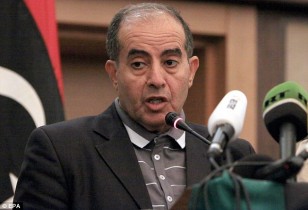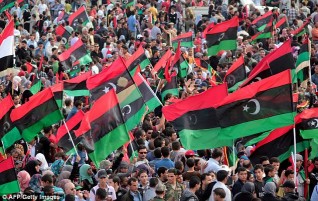Editor’s Note – Be careful of what you ask for. When you kick over a can of worms, it may be more than worms that emerge. Now that the dictator is gone, what is emerging from the can of worms may be more volatile, especially if Shariah Law becomes the backbone of the ‘new’ Libya.
Islamic Sharia law will be the ‘basic source’ of legislation in free Libya, says new leader
- I regret Gaddafi death says prime minister: Tyrant ‘should have answered for his crimes in court’
- ‘Embrace honesty, patience and mercy,’ NTC head tells Libyans
By SAM GREENHILL
Libya’s new prime minister has laid out a vision for his country’s new legal system – and it may come as a bit of shock to some of the millions of citizens still celebrating their new-found freedom.
Mahmoud Jibril said the country’s legislature would have an Islamist tint and existing laws that contradict the teachings of Islam would be nullified.
He outlined several changes in a major speech, including putting caps on interest for bank loans and lifting restrictions on the number of wives Libyan men can take. The Muslim holy book, the Koran, allows men up to four wives.
Mr Jibril also thanked those who fought and fell in the war, saying they ‘are somewhere better than here, with God.’
Displaying his own piety, he then stepped aside from the podium and knelt to offer a prayer of thanks.
But, after Libya announced its official liberation from Colonel Gaddafi’s 42-year rule yesterday, the nation’s new leader said he wished the hated despot was still alive.
Prime minister Jibril said he would have preferred to see Gaddafi put on trial for his crimes.
‘I want to know why he did this to the Libyan people,’ Mr Jibril explained. ‘I wish I were his prosecutor in his trial, because this is the question in everybody’s mind: Why?

Unanswered questions: Libya's Prime Minister Mahmoud Jibril wanted the opportunity to interrogate Gaddafi
‘Did the Libyan people deserve what he did throughout 42 years of oppression, of killing, of everything?’
Britain yesterday urged the new Libyan government to investigate the killing of Gaddafi last week.
Defence Secretary Philip Hammond said the reputation of the ruling National Transitional Council had been ‘a little bit stained’ by the way the dictator died at the hands of his captors.
Graphic footage broadcast around the world from the scene showed a wounded and bleeding Gaddafi being manhandled by fighters loyal to the NTC before apparently being shot.
But few in Libya were mourning Gaddafi’s passing yesterday as the Libyan people finally declared themselves liberated.
Tens of thousands joined in scenes of wild jubilation nationwide as the country’s interim government brought a formal close to eight months of bloodshed to unseat the dictator and his family. They started the countdown to democracy by announcing there would be elections within months.
The long-awaited declaration of liberation came more than two months after revolutionary forces swept into Tripoli and seized control of most of the oil-rich nation. The end was delayed by fierce resistance from Gaddafi loyalists in his hometown of Sirte, as well as in Bani Walid and pockets in the south.
At a ceremony in the eastern city of Benghazi, where the revolution began, Mr Jibril declared the defeat of Gaddafi a ‘great moment’, but he warned the Libyan people to remember the agony of the past and choose a different path for the future.
With Gaddafi gone, he said, the NTC must move swiftly to transform the country into a democracy.
Among its first challenges is to disarm the freedom fighters, most of whom were students, office workers and factory hands who underwent rudimentary military training when the uprising began. Mr Jibril said it was a priority to ensure huge caches of weapons were turned in over the ‘next few days’.
The vast majority of Libyans appear glad Gaddafi is dead. Many think it will allow the nation to move forward without fear that his supporters will try to sabotage the transition to democracy.
But the UN and Amnesty International have demanded an investigation into evidence suggesting the former leader was summarily executed after being captured alive.
A bullet hole in Gaddafi’s left temple has been hidden from view by his head being tilted to one side in the freezer room where his body is on show to the public. A blanket also hides the bruises on his torso and scratch marks on his chest that had earlier been visible.
Mobile phone footage of Gaddafi’s last moments shows the bloodied dictator being taunted with a pistol, before a single shot rings out, followed by silence.
Omran al-Oweib, the commander of the rebels who captured Gaddafi, admitted things had ‘got out of hand’ among young soldiers when they tried to bring him in alive.
Before the doomed dash for freedom that ended in his death, rebels discovered that Gaddafi had hidden for two weeks in a boarded-up house in Sirte, living on ready meals and tinned tomatoes.
But as the neighbourhood crumbled around him under the revolutionaries’ shelling, his sense of self-importance remained intact – a wall in his bolthole was decorated with a signed photograph of himself in his naval commander’s uniform.
Also found in the house were a brocaded cranberry silk waistcoat – size 54 – with a handmade gold-striped tie and some Italian shirts.
n Between 60 and 70 per cent of Tunisian voters turned out for their country’s first free elections yesterday. They were voting to elect an assembly to appoint a new government after an Arab Spring uprising.
The long-banned Ennahda party is expected to win when the results are announced today.



